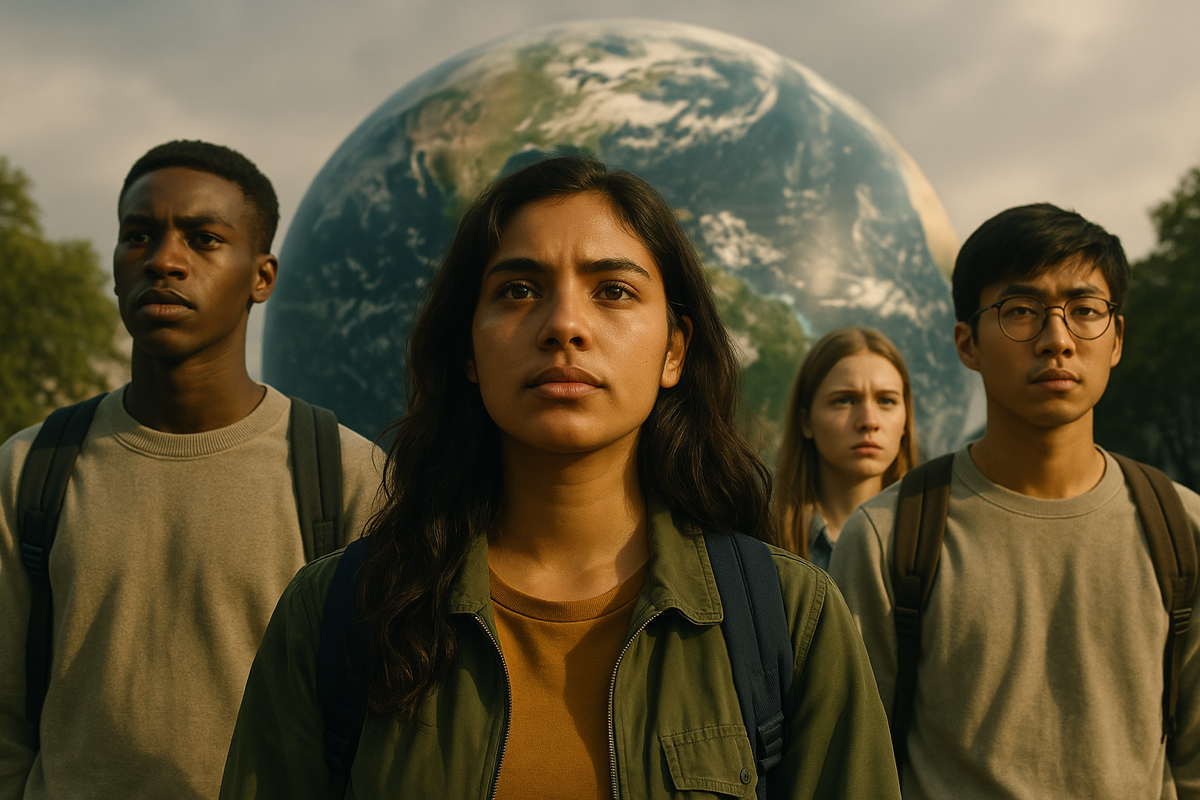
 John Moravec
John MoravecEducating for a shared planet
We are living through overlapping global crises: climate breakdown, mass displacement, ecological collapse, rising authoritarianism, and digital fragmentation. These forces are not distant trends; they shape everyday life. Young people are coming of age in a world marked by instability, inequality, and ecological fragility. Yet most education systems still treat these challenges as abstract or optional. Curricula remain siloed and inward-looking, disconnected from the realities students face and the futures they must shape.
If education is to remain relevant, it must shift from preparing students to succeed in a competitive marketplace to preparing them to sustain life on a shared planet. That is, we must remission education as a practice of shared responsibility, not as a means of individual advancement on its own. We need educational experiences that build students’ capacities to understand interdependence, navigate complexity, and act with care across cultural and ecological boundaries. In short, we need to teach for planetary citizenship.
Building a simple awareness of global problems will not contribute to solving these prblems; students must be prepared to respond with insight, care, and be ready to act with insight. We must shift from content delivery to a pedagogy rooted in relationships, systems thinking, and real-world engagement. Learning must help students make sense of complexity and act responsibly within it.
Global citizenship education pushes beyond textbook knowledge. It emphasizes empathy, ethical reasoning, and collaboration across difference. Rather than viewing global problems as distant, students are encouraged to connect them to their own communities and experiences. This approach moves away from a charity mindset. It centers solidarity, justice, and mutual learning, positioning students not as saviors, but as co-creators of sustainable futures.
From Manifesto 25:
Acts of global citizenship transform personal experience into planetary impact. Rooted in local contexts and meaningful engagement with diverse communities, it bridges individual perspectives with global challenges. Education must equip learners to tackle these challenges through cross-cultural empathy, ethical responsibility, and collaborative problem-solving. This requires planetary-focused literacies—frameworks that connect local actions to global solutions while respecting individual and collective rights. By aligning personal agency with shared tools, education empowers learners to act locally and globally, shaping sustainable and equitable futures.
From global to planetary citizenship
Effective global citizenship education requires planetary-focused literacies, practical frameworks that help learners understand complex global dynamics and their relationship with local issues. For example, students studying climate change might explore local impacts such as urban heat islands or agricultural disruptions, learning how community-specific actions can influence broader solutions. Through case studies and experiential projects, learners develop the capacity to analyze global systems and identify local leverage points for change.
Planetary citizenship extends the vision of global citizenship. This distinction matters because it shapes how we design learning: not only what we teach, but how we ask students to think, feel, and act. It recognizes that our responsibilities extend beyond people to the living systems that sustain us. Students learn to understand the Earth not just as a backdrop to human activity, but as a dynamic, interdependent system that demands care, humility, and action.
| Concept | Core focus | Key practices |
| Global citizenship | Civic participation and justice in a globalized world | Service learning, issue debates, human rights education |
| Planetary citizenship | Care, interdependence, and ecological sustainability | Systems thinking, local-global analysis, ethical action |
To prepare students for life on a shared planet, education must:
- Develop planetary literacies: Frameworks that help learners connect local conditions to global systems and act with ecological and ethical insight.
- Emphasize experiential learning: Case studies, simulations, and community projects that expose learners to real-world complexities and dilemmas.
- Foster cross-cultural empathy: Opportunities to engage directly with diverse communities, challenge assumptions, and learn across difference.
- Engage in ethical reasoning: Teaching students to weigh competing responsibilities, between individual and collective, present and future, human and non-human.
- Build collaborative skills: Interdisciplinary teamwork that mirrors the interconnected nature of today’s challenges.
Traditional education often delivers knowledge as static content. But planetary learning must be dynamic, immersive, and deeply relational. It requires students to engage not just with new information, but with new ways of seeing themselves in the world.
One example is the EVOKE project, developed by the World Bank as a “crash course in changing the world.” Initially piloted in Africa and Latin America, EVOKE immerses students in storytelling, game-based challenges, and real-world missions focused on food security, energy, water, and disaster resilience. Through role-play and systems thinking, learners tackle local problems while drawing on global knowledge networks to solve grand challenges. The model helps students see themselves not as future professionals but as present agents of change, capable of designing solutions with global impact. EVOKE illustrates how game-based, narrative-driven learning can foster empathy, innovation, and civic responsibility across cultures.
Learning to solve global grand challenges cultivates empathy, imagination, and agency. It bridges the gap between awareness and action, between local experience and planetary impact.
Developing planetary citizenship requires learning across difference. As students grapple with local-global issues, they must be equipped to listen, question assumptions, and engage with people whose perspectives may challenge their own. This demands intentional strategies to bring the world into the classroom and the classroom into the world.
Internationalization plays a vital role in building planetary citizenship. When rooted in equity and reciprocity, it helps students engage with diverse perspectives, confront shared challenges, and collaborate across borders. This involves more than symbolic exchanges. It requires deep integration of global perspectives into curriculum, pedagogy, and institutional priorities, supported by meaningful partnerships, digital collaboration, and multilingual learning.
Internationalization of education is the intentional integration of global perspectives, cross-cultural experiences, and international collaboration into teaching, learning, and institutional practices. It aims to prepare learners to navigate and contribute to an interconnected world by fostering empathy, cultural understanding, and shared responsibility for global challenges.
To be meaningful, internationalization must go beyond superficial global themes or symbolic partnerships. It must integrate global perspectives into curriculum design, pedagogy, and institutional priorities, ensuring that learners engage with real-world issues from multiple cultural and geopolitical standpoints. When grounded in equity and reciprocity, internationalization can serve as a powerful driver of transformation, enabling students to connect personal agency with global impact.
This begins with empathy. Schools must create opportunities for learners to engage directly with diverse communities, whether through international partnerships, virtual exchanges, or community-based projects that cross cultural or socioeconomic boundaries. By fostering understanding and respect for different perspectives, learners become more capable collaborators, able to address global challenges collectively rather than in isolation.
Encouraging ethical responsibility and agency empowers learners to act decisively. Education should guide students in understanding their rights and responsibilities within interconnected global systems, teaching them to balance individual needs with collective welfare. Students gain skills in ethical reasoning, preparing them to navigate complex issues such as resource distribution, human rights, and environmental stewardship thoughtfully and effectively.
Collaborative problem-solving further enables learners to address global challenges practically. Schools should prioritize interdisciplinary projects, simulations, and problem-based learning experiences that require teamwork, negotiation, and the integration of diverse viewpoints. Such experiences teach students to manage complexities and uncertainties inherent in global issues, preparing them to craft sustainable and equitable solutions.
Courageous leadership for a shared future
To equip learners for a shared planetary future, education must align individual agency with collective tools and shared responsibilities. Students need the frameworks, relationships, and real-world experiences that help them turn local actions into global impact. But this transformation will not happen on its own.
Courageous leadership is necessary to move beyond outdated metrics and short-term outcomes. Leaders must take a moral stance, a willingness to act on what is right, even when doing so is inconvenient, unpopular, or ahead of its time. It begins with asking different questions: What kind of world are we educating for? Who is left out of our vision of the future? What truths are we avoiding because they are uncomfortable to teach? Courageous leaders listen when students speak about their fears, their hopes, and their desire for a future that feels possible. They do not rush to reassure. They take these concerns seriously, and respond by rethinking priorities, reallocating resources, and modeling responsibility.
Such leadership is rarely heroic. It is unglamorous: choosing to slow down a rushed curriculum to make space for reflection; pushing back on a donor whose values undermine the mission; or inviting staff, students, and families into difficult conversations about equity, identity, and impact. It means building trust across difference, even when it’s easier to manage compliance. It means holding the line when fast fixes and easy narratives are on offer. Courageous leaders show strategic thinking and accountability. They understand that what we normalize in today’s classrooms defines what is possible tomorrow.
Planetary citizenship will not emerge from updated lesson plans alone. It requires a shift in how we lead and why we lead. Courageous leadership creates the conditions for deeper learning, moral clarity, and collective care. It signals to students that they are not being prepared to fit into a broken world, but to repair and reimagine it.
This situation is urgent, and so is the possibility. If we act with courage and conviction, education can help the next generation carry forward not only knowledge, but a better opportunity in which we may all flourish.
Read and sign Manifesto 25 at https://manifesto25.org

